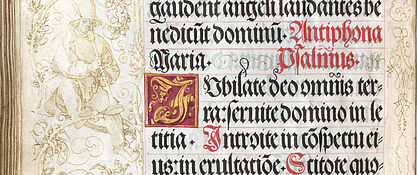Images: © Bayerische Staatsbibliothek, 2° L.impr.membr. 64
The Book as an Experimental Space for Artists

The Book as an Experimental Space for Artists
International Colloquium 27-28 September 2019
University of Vienna, Department of Art History, SR 1
The VII. Vienna Colloquium on Book Illumination will discuss the roles played by artists in the production of decorated books (manuscripts and prints) in Europe around 1500. By the end of the 15th century the standards of the modern printed book (title page, printed illustrations, imprint) had been established without diminishing the flourishing of manuscripts. Neither the invention of printing nor the growing aesthetic autonomy of printed books around 1500 came about as radical changes. Instead, the growing need for books and their enormously increased production and expanded trade throughout Europe resulted both in serial fabrication and in highly individual designs.
In a continuous balancing act between tradition, adaptation and evolution the shaping of books for different demands had to be negotiated between the protagonists of divers markets. Different regional traditions were transferred between European centres and different media (book illumination, image printing, drawing or panel painting). An important factor of exchange and appropriation was the extensive mobility of artists and objects through trade, networks of monastic orders and humanist circles or the range of courtly patronage. While some innovations prepared the later standard, other creative inventions were either temporarily or permanently abandoned.
The art historical colloquium is inspired by four research projects on Central European book illumination in the second half of the 15th century and organized in cooperation between the research centre for book illumination (Pächt-Archiv) in the department of art history of the University of Vienna (Dr. Armand Tif, Dr. Caroline Zöhl) and the Institute for Medieval Research at the Austrian Academy of Sciences (Dr. Maria Theisen). The colloquium’s goal is an international exchange between researchers from different institutions and research cultures about diverse approaches to the subject.

